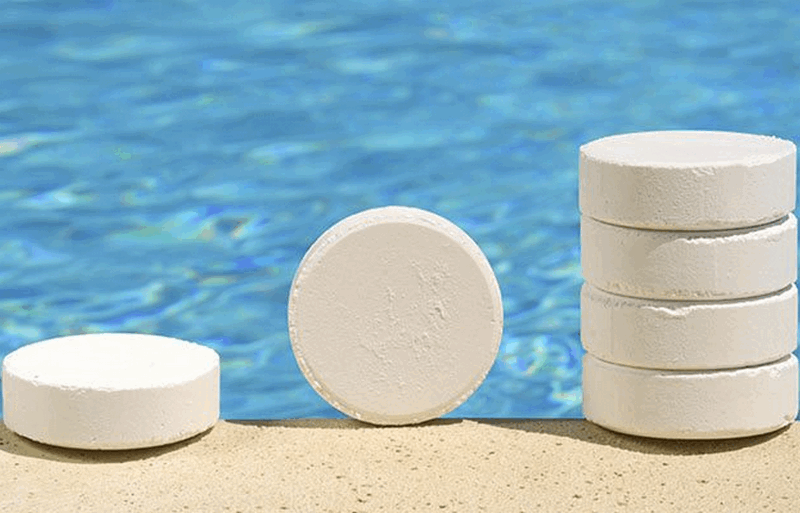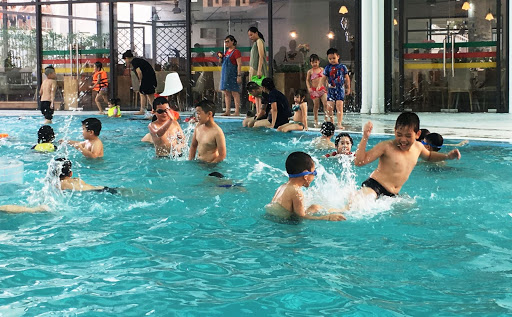- Home
- Knowledge
- General knowledge
- Detail
Answer: You need to understand how toxic the water in the swimming pool is!
On hot summer days, swimming is a water sport chosen by many families. Not only does it help relieve the summer heat, with a comfortable swimming pool space, you can have fun. And to ensure clean pool water with a large number of swimmers, many swimming pools often use chlorine chemicals to clean. So how toxic is the water in the swimming pool ? Does it affect your health? Let's find out the details in the article below.
Learn more about Chlorine
Chlorine is known as a disinfectant, used in swimming pools to ensure clean water and hygiene. Chlorine compounds have two main forms: calcium hypochlorite (in solid form) and sodium hypochlorite (in liquid form). This compound, when reacting with water, will form hypochlorous acid. The acid will eliminate and destroy bacteria and pathogens by breaking down lipid membranes, destroying enzymes, and bacterial cell larvae through oxidation reactions.

Chlorine is a compound used to sanitize, disinfect, and clean swimming pool water.
Current status of swimming pool water
Outdoor swimming pools are one of the places where the water in the pool is most easily contaminated. These pools are often in direct contact with the outside environment, contaminated by dirt, algae, germs in rainwater or bird droppings,...
In addition, swimming pool water is also polluted by the effects of microorganisms, sweat, cosmetics, sunscreen, saliva, urine on the bodies of swimmers, etc. Therefore, to ensure safe and clean swimming pool water, it is necessary to chemically treat it before use.
And chlorine compounds are often used in swimming pools. This chemical helps disinfect and quickly destroy water pollutants. In addition, some swimming pools now use chemicals to make the pool water green, creating an eye-catching sea-like effect without affecting the health of users.

Outdoor swimming pools are more susceptible to water contamination than indoor pools.
How toxic is swimming pool water? What are the effects of chlorine?
How toxic is the water in your swimming pool ? If the pool water is not cleaned properly, the pool will be an ideal habitat for many types of bacteria. Typically, Cryptosporidium bacteria - the agent that causes diarrhea in humans or Chlamydia Trachomatis bacteria - causes conjunctivitis. If the pool uses chlorine chemicals in excess of the permitted level, it will irritate the skin, eyes and affect health:
Chlorine in swimming pool water reacts with skin cells, sweat, urine, and other agents to produce various by-products. Various studies have linked some of these chemicals to bladder cancer and asthma.
Besides, many studies show that: people working in swimming pools have a higher risk of eye, nose and throat diseases than other groups.

How toxic is swimming pool water? Affects eyes, ears, nose
Signs to know if the swimming pool is safe?
Besides wondering how toxic the water in the swimming pool is ? To ensure safety for your health, you need to make sure to choose a clean swimming pool. Here are some signs you need to know:
- The first sign that you can recognize whether a swimming pool is safe or not is the characteristic smell of chlorine. If you can clearly smell chlorine, it means that the water in the swimming pool has not been properly treated.
- A standard swimming pool must ensure a natural look: the bottom of the pool is clearly visible, the water has a moderate blue color, no foreign objects, or turbidity. If you notice an unusually blue color of the pool water, you need to pay attention.
- Humans are one of the direct causes of swimming pool water pollution. Therefore, if the swimming pool has too many swimmers, the water filter in the pool may be overloaded and not be able to remove harmful toxins in time.
Through the above analysis, we have helped you answer the question: how toxic is the water in the swimming pool to the health of swimmers? If the water in the swimming pool is not treated properly, it will be an environment for bacteria to grow, directly affecting the health of swimmers. Therefore, to ensure your health, you need to make sure to choose a reputable swimming address, clean swimming pool water, and proper hygiene.











